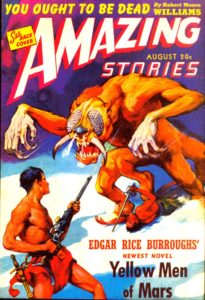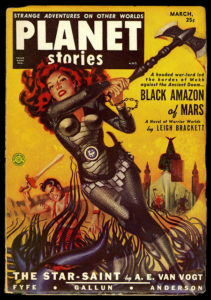How to Write Pulp Fiction for Fun and Profit – Part 8
Posted by Rampant Coyote on June 29, 2017
 This is the final part of my article series on writing pulp fiction. You know everything I do on the subject now. Seriously… I’m not that smart. I have co-taught this class with people who have a lot more experience and knowledge than I do. I’m more of the zealous newly-converted.
This is the final part of my article series on writing pulp fiction. You know everything I do on the subject now. Seriously… I’m not that smart. I have co-taught this class with people who have a lot more experience and knowledge than I do. I’m more of the zealous newly-converted.
As much as has been covered here, the final take-away is this: There’s no magic here. There never was. It’s just hard work and craft and a particular style of story. The stories that we now recognize as classics were once just stories, paid for at a standard rate of a penny a word, and were just one of many largely forgotten works by extremely prolific, hard-working writers.
Go back and read the stories. Learn what they were really like, not what modern critics paint them to be. Maybe some seem quaint, or the language seems weird, or the science is laughable today, but if you are looking for some lost gems of genre fiction, there are tons to be discovered. Too many modern stories seem to try too hard to be “about” anything except entertainment. Going back to the old pulp stories, or to this new surge in stories that are emulating (consciously or not) the classic pulp style with action-oriented, tightly-written, and entertaining yarns, I find my joy of reading rekindled.
That’s not to say that that a pulp story should only be about entertainment. And after all, the best entertainment is thought provoking. But entertainment remains the primary purpose. If a story fails at that, it is worthless to me. If it succeeds wonderfully at that, everything else is delicious gravy.
I figured I’d follow up with some great bits of advice I’ve discovered from the pulpists of the past. Most of the advice is as useful today as it was when it was printed.
Words From People Who Actually Knew What They Were Talking About
“The faster I write, the better my output. If I’m going slow, I’m in trouble. It means I’m pushing the words instead of being pulled by them.” – Raymond Chandler
“No fiction is worth reading except for entertainment. If it entertains and is clean, it is good literature, or its kind. If it forms the habit of reading, in people who might not read otherwise, it is the best literature.” – Edgar Rice Burroughs
“What I try to do is write a story about a detective rather than a detective story. Keeping the reader fooled until the last, possible moment is a good trick and I usually try to play it, but I can’t attach more than secondary importance to it. The puzzle isn’t so interesting to me as the behavior of the detective attacking it.” – Dashiell Hammett
 “When in doubt, have a man come through the door with a gun in his hand.” – Raymond Chandler
“When in doubt, have a man come through the door with a gun in his hand.” – Raymond Chandler
“I think particularly in this country people are so distanced from literature, the way it’s taught in schools, that they think that people who write are magicians on a mountaintop somewhere… It’s a job of work, like being a plumber or an electrician.” – Harlan Ellison
“It is not necessary to stage a gun battle from start to finish, with a murder or a killing in every other paragraph. You can keep it alive and moving, when sympathy is once aroused, by tension and suspense, through dialogue or other form of plot development, when action is absent. Action in one form or another is, however, pretty generally in demand.” – Joe Shaw
“[Do] not try to do everything at once. If it is a puzzle story operating in a rather cool, reasonable atmosphere, it cannot also be a violent adventure or a passionate romance.” – Raymond Chandler
“We must have a good, fast opening. Smack us within the first paragraph. Get our interest aroused. Don’t tell us about the general geographic situation or the atmospheric conditions. Don’t describe the hero’s physique, or the kind of pants he wears. Start something!” — John Byrne
“Heart interest and human emotion are the special requirements. Stories should be strongly melodramatic, the characters should be very real and appealing, and situations should deal with the poignant phases [of the events].” – Roger Terrill
“Menace must be so strong that the reader following the hero vicariously is really frightened lest he can’t extricate himself. Villains who are mere thugs are taboo; they must be resourceful, diabolic. Motives and actions may stretch plausibility, but must always seem possible. Heroes must be of such colorful nature that the reader easily identifies himself with them and wants to follow along. Action must be very vivid, with such great detail that the emotion of fear is heightened. Not action merely to advance the plot, but to serve an emotional purpose.” – Carson W. Mowre
“Be honest with the reader” – Raymond Chandler
“No amount of money today could possibly give me the thrill that first $400 check gave me.” – Edgar Rice Burroughs
 And finally, my favorite quote from Leigh Brackett:
And finally, my favorite quote from Leigh Brackett:
“Space opera, as every reader doubtless knows, is a pejorative term often applied to a story that has an element of adventure. Over the decades, brilliant and talented new writers appear, receiving great acclaim, and each and every one of them can be expected to write at least one article stating flatly that the day of space opera is over and done, thank goodness, and that henceforth these crude tales of interplanetary nonsense will be replaced by whatever type of story that writer happens to favor — closet dramas, psychological dramas, sex dramas, etc., but by God important dramas, containing nothing but Big Thinks. Ten years later, the writer in question may or may not still be around, but the space opera can be found right where it always was, sturdily driving its dark trade in heroes.” ― Leigh Brackett
Special Thanks
I’ve had several people provide me with advice and input for both the class and my article series here. I want to thank David Boop, David West, Leigh Saunders, Bryce Beattie (editor of StoryHack), and P. Alexander (editor of Cirsova) for their help. Check out their books!
What’s Next?
You!
Write.
And as always, have fun!
Links to the series:
How to Write Pulp Fiction for Fun and Profit – Part 1, Part 2, Part 3, Part 4, Part 5, Part 6, Part 7
Filed Under: Books, Pulp, Short Fiction, Writing - Comments: Comments are off for this article